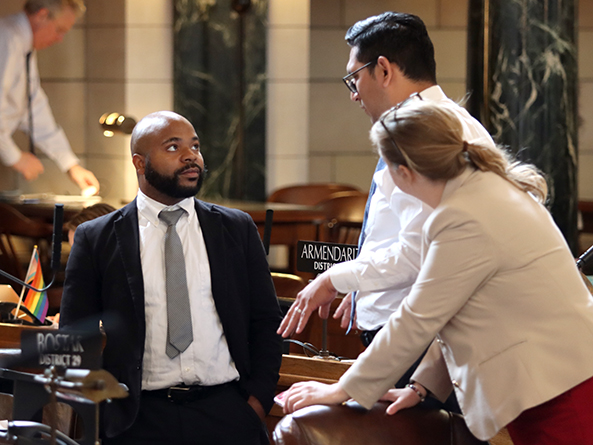Pandemic funding update expanded, advanced to final round
A bill that would update a measure passed by the Legislature last year related to federal pandemic funds was expanded to become an omnibus urban affairs measure and given second-round approval May 18.

LB531, as introduced by Sen. Terrell McKinney of Omaha, would make clean-up changes to the Economic Recovery Act passed by the Legislature in 2022, which provided funding for pandemic recovery projects in North and South Omaha and other communities that were disproportionately impacted by the COVID-19 pandemic.
The 2022 measure was designed to use federal American Rescue Plan Act funds, as well as transfers from the state’s cash reserve, to fund grant programs through the Economic Recovery and Incentive Division of the state Department of Economic Development.
Among other provisions, as amended on general file, LB531 would create and outline administration of the North and South Omaha Grant Program and authorize a $180 million grant to a primary class city to fund a water treatment plant, land acquisition, wellfields, permitting, pumping and transportation costs for potable water.
Lincoln currently is Nebraska’s only primary class city.
McKinney, chairperson of the Urban Affairs Committee, offered an amendment on select file, adopted 37-3, that replaced the bill. He said the amendment represents the committee’s priorities for the current legislative session and includes a number of measures meant to spur economic development across the state.
Omaha Sen. Justin Wayne supported the amendment, saying it would result in an additional $11 million for projects in western Nebraska, including adding site acquisition, preparation and rail spur construction within 30 miles of the state’s largest reservoir as a qualified use of an iHub grant.
McKinney said he worked to find innovative funding sources for the bill’s grant program, including crediting investment earnings from the Perkins County Canal Project Fund in fiscal year 2023-24, FY2024-25 and FY2025-26 to the Economic Recovery Contingency Fund.
Elmwood Sen. Robert Clements objected to the amendment, saying interest from the canal fund — which he said could be as much as $40 million a year — should be credited back to the fund to guard against likely inflationary increases in the cost of the canal project by the time it is built.
Among other changes, the amendment also added the provisions of McKinney’s LB629, which would update the Middle Income Workforce Housing Investment Act and the Economic Recovery Act. It also includes provisions of several additional bills.
LB33, introduced by North Platte Sen. Mike Jacobson, would allow the mayor of a first or second class city to vote on any matter that requires a majority vote of the city council if there is an absence or the council is equally divided. The provisions would not allow the mayor to vote when a super-majority vote of the council is required.
LB45, originally introduced by Adams Sen. Myron Dorn, would create the Revitalize Rural Nebraska Grant Fund for first and second class cities and villages and provide $1 million in general funds. The program would be administered by the state Department of Environment and Energy and grants would be used to demolish dilapidated commercial property.
The provisions of LB98, introduced by Jacobson, would make changes to “micro” tax-increment financing projects by allowing limits on the number of expedited reviews of redevelopment plans, denial of redevelopment plans and an optional resolution before an area is declared substandard and blighted.
LB170, introduced by McKinney, would harmonize the definition of a blighted area under the Nebraska Investment Finance Authority Act and the state’s Community Development Law.
Also introduced by McKinney, LB223 would require all cities that adopt an affordable housing action plan to submit their plan to the Urban Affairs Committee electronically and provide an option in the report to show effort toward an affordable housing action plan or to implement such a plan after it is adopted.
LB342, introduced by Gering Sen. Brian Hardin, would remove a requirement that home inspectors register with the secretary of state every even-numbered year and allow them to renew registration within 45 days of expiration. It also would provide that registration is valid for two years.
Finally, LB532, introduced by McKinney, would make a number of changes to the state’s Community Development Law, including: requiring an “extremely blighted” designation to last for at least 25 years; extending the deadline from 24 months to 60 months for housing studies in all but metropolitan class cities; and placing limits on creation of new redevelopment plans in areas already designated as blighted.
Other amendments
Omaha Sen. Justin Wayne offered an amendment, based on his LB474, which initially would have required the state Game and Parks Commission to purchase or receive by donation, and subsequently manage, the Mayhew Cabin historical site in Nebraska City.
The purchase originally would have been financed with $1.5 million from the State Settlement Cash Fund, with an addition $2 million from the fund to construct a visitor center and $950,000 from the fund for exhibit fabrication, historical interpretation and staffing.
Wayne said the cabin once was the home of John Kagi — who later fought alongside abolitionist John Brown and died during the raid on Harper’s Ferry, Virginia — and recently was recognized as an Underground Railroad site by the National Parks Service.
The cabin currently is closed to the public, he said, due to damage from the 2019 floods and a subsequent legal battle over whether responsibility for repairs lies with the foundation that currently owns the cabin or Nebraska City.
“It would be shameful if we lost this site,” Wayne said.
Dunbar Sen. Julie Slama supported the amendment, saying the cabin was an important destination for southeastern Nebraskans and others, including student field trips, for generations before it closed.
“This is the only recognized existing stop [on] the Underground Railroad located in the state of Nebraska,” Slama said. “This site is worth preserving, it’s worth protecting and it’s worth ensuring that generations of Nebraskans to come [are able to] learn about this valuable historical site.”
Elmwood Sen. Robert Clements objected to using the State Settlement Cash Fund for the project and noted that the Game and Parks Commission has deferred maintenance issues with buildings that they already own and operate.
Wayne then offered a floor amendment to his amendment that instead simply would require the commission to purchase or receive the Mayhew Cabin historical site and subsequently rehabilitate and manage it. He said the state’s existing 309 Task Force for Building Renewal could be used to structure and facilitate the transfer.
The amendment was adopted on a 38-0 vote and the underlying amendment was adopted 40-0.
Another amendment, offered by Sen. Jane Raybould of Lincoln and adopted 28-4, added her LB329. The provisions would prohibit the state building code from limiting the use of a refrigerant designated as acceptable for use under federal law as of Jan. 1, 2023, as long as any equipment containing such refrigerant is listed and installed in accordance with safety standards and use conditions.
Sen. Danielle Conrad of Lincoln brought an amendment to add provisions of her LB462, adopted 31-0, that would update qualifications for owner-occupied housing units under the Middle Income Workforce Housing Investment Act. The amendment would increase the qualifying cost to total construction costs of no more than $330,000.
Following adoption of two additional technical amendments, senators advanced LB531 to final reading by voice vote.


